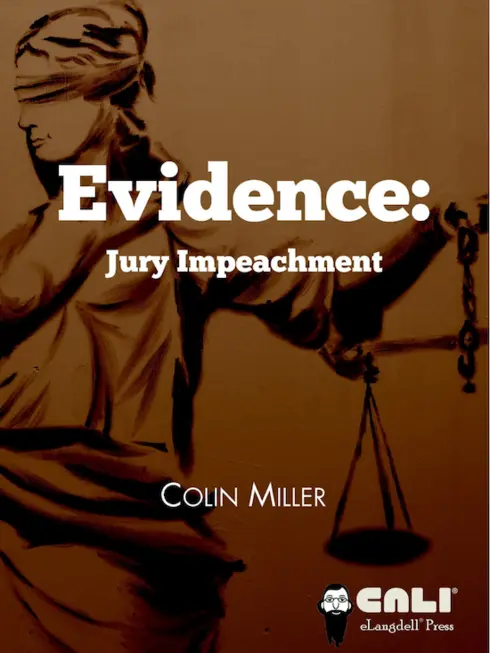
Evidence: Jury Impeachment
No ratings
Colin Miller, University of South Carolina
Copyright Year:
Publisher: CALI's eLangdell® Press
Language: English
Formats Available
Conditions of Use
![]() Attribution-NonCommercial-ShareAlike
Attribution-NonCommercial-ShareAlike
CC BY-NC-SA
Table of Contents
Jury Impeachment Chapter
- I. The Rule
- II. Historical Origins
- III. The Drafting of Federal Rule of Evidence 606(b)
- IV. Public Policy Underlying Federal Rule of Evidence 606(b)
- V. Supreme Court Precedent
- VI. 606(b): The External/Internal Distinction
- VII. Situations Where Rule 606(b) Does Not Apply
- VIII. Splits in Authority
- IX. Jury Impeachment Pleadings
About the Book
The anti-jury impeachment rule, contained in Federal Rule of Evidence 606(b) and state counterparts, is a rule preventing the admission of jury testimony or statements in connection with an inquiry into the validity of the verdict, subject to certain exceptions. Through a series of cases and hypotheticals drawn from actual cases, this chapter gives readers a roadmap for how to address any jury impeachment issue in practice.
Faculty materials also available:
In addition to the free, open learning materials for students listed above, this eLangdell chapter includes a teacher's manual. Faculty and staff at CALI member schools can access these materials by logging in to eLangdell with a cali.org username and password. Contact CALI if you have questions.
About the Contributors
Author
Colin Miller is an associate professor at the University of South Carolina where he teaches Evidence, Criminal Procedure, Criminal Law, and Civil Procedure. He is the creator and editor of EvidenceProf Blog, a member of the Law Professor Blogs Network. He is the editor of Illinois Criminal Procedure and drafted a 100 page report comparing the Federal Rules of Evidence to Illinois evidentiary principles, which was used in the creation of the first Illinois Rules of Evidence.
Professor Miller received his B.A. degree with distinction from the University of Virginia and his J.D. (Order of the Coif) from the William & Mary Law School.
Ancillaries
Student Resources
- CALI's eLangdell® Press (by request)
